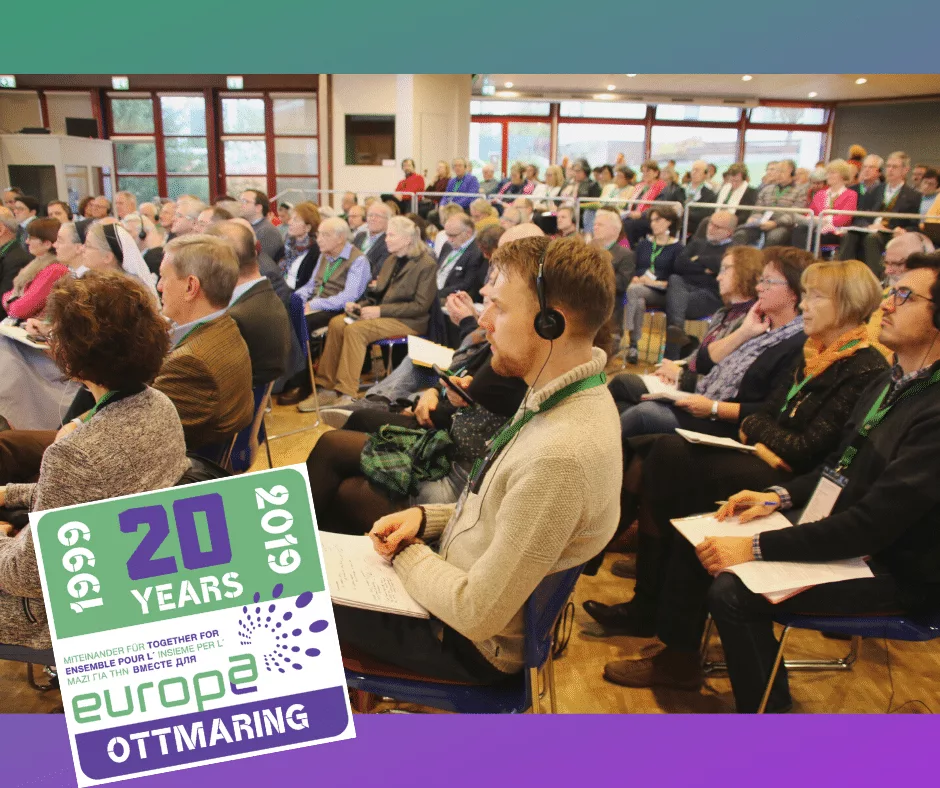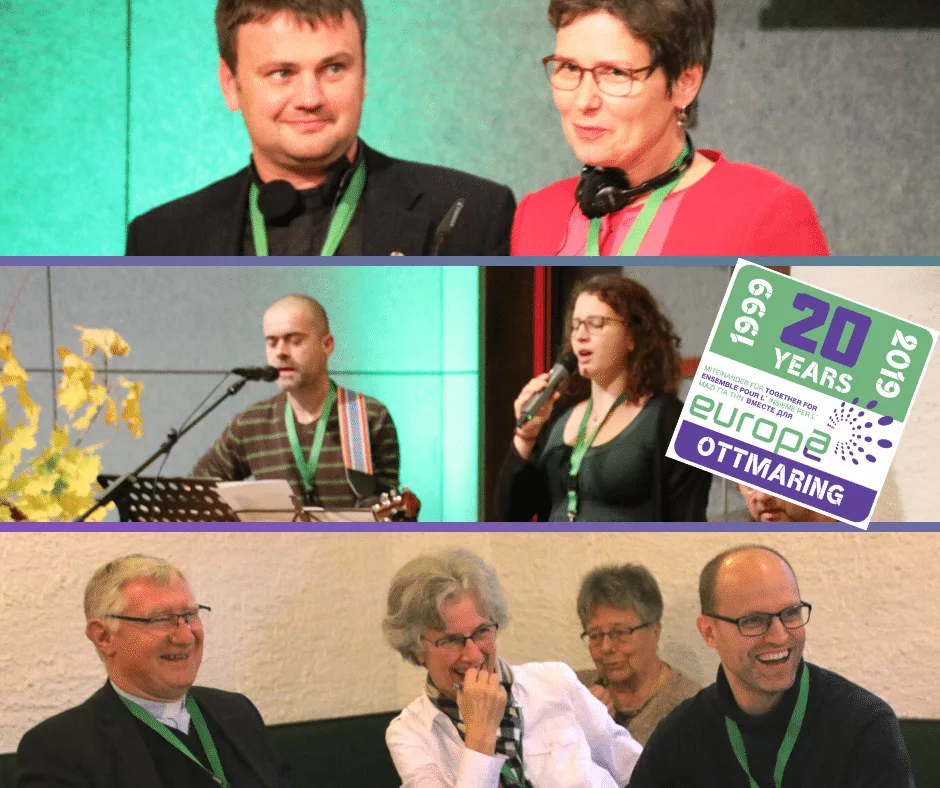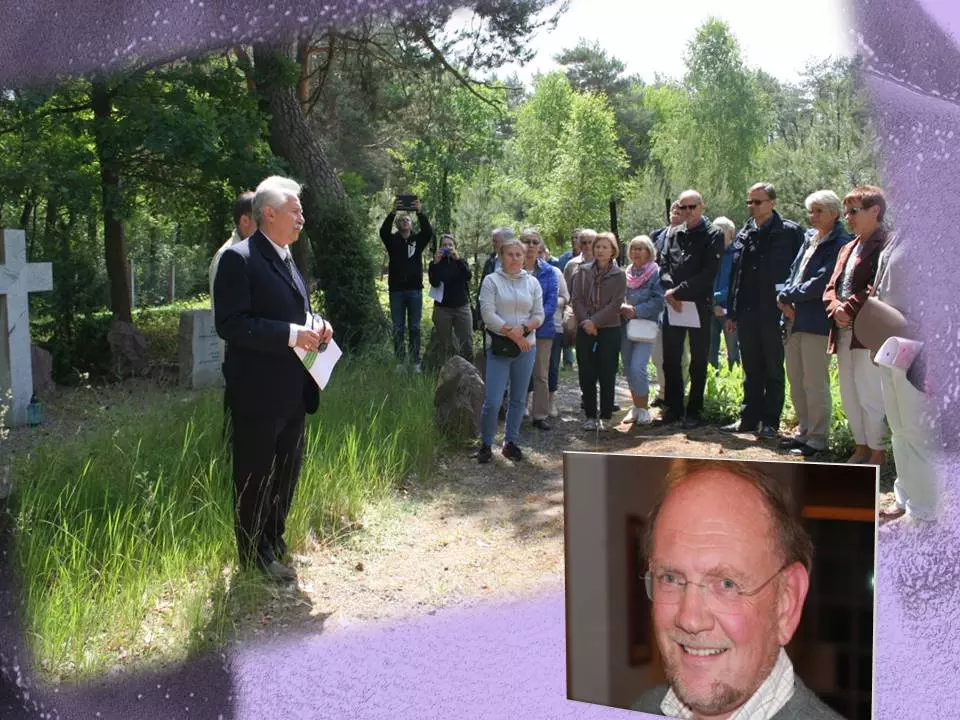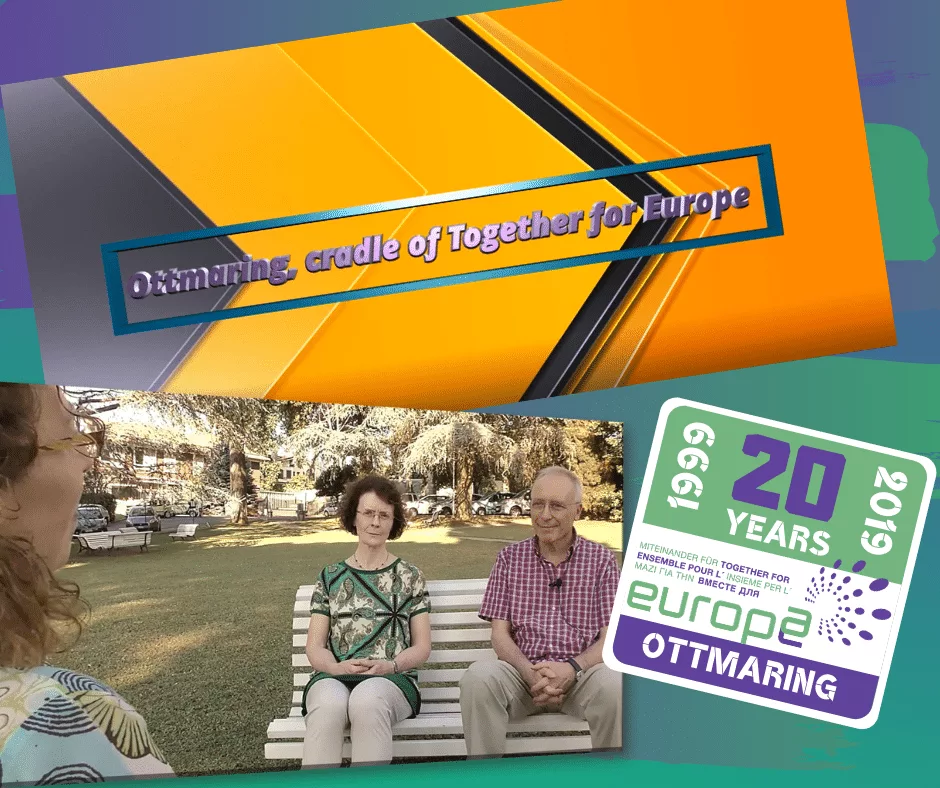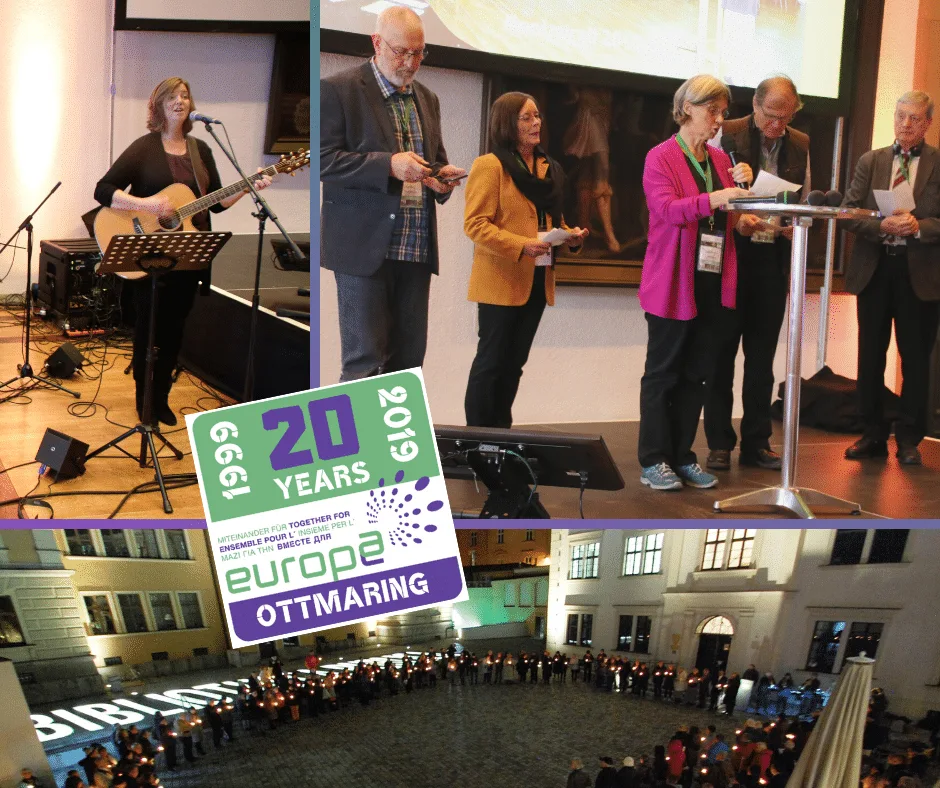
by TogetherforEurope | Nov 9, 2019 | 2019 Ottmaring ! 20 Years, News
Ambassadors of reconciliation and signs of hope. Together for Europe celebrated its anniversary in the Augsburg city hall
300 members from 55 Christian communities and movements from various churches and from 25 European countries were gathered this Saturday to celebrate several important anniversaries: 30 years ago the Berlin Wall fell and a new era of encounter between East and West began for Europe. 20 years ago the ‘Joint Declaration of the Doctrine of Justification’ was signed by representatives of the Lutheran World Federation and the Catholic Church. On the same day in the afternoon, the first group of leaders from various catholic, evangelical and free church backgrounds came together in Ottmaring – this was when the network Together for Europe was born. Those three events were closely linked for the people present and shaped the ‘pioneering spirit’ of the initiative.
‘You are ambassadors of reconciliation’, encouraged Lutheran Bishop, Ret., Christian Krause. He had co-signed the ‘Joint Declaration’ in 1999 as the then President of the Lutheran World Federation. As one of the witnesses at the time he recalled the many encouraging steps that have been taken in ecumenism through the declaration and since it was made. In the current climate of increasing scepticism of Europe and political polarization, it is precisely this experience of reconciled diversity of the movements and spiritual communities that is needed.
Bertram Meier, the current diocesan administrator in Augsburg, emphasised in the conversation with his Evangelical colleague Regional Bishop Axel Piper the importance of this ability to seek reconciliation. ‘Unity in diversity is also a challenge within the church. It’s about learning to understand each other, not just from the mind, but also from the heart.’ Piper confirmed that it is exactly this effort that also shapes the ecumenical relations in Augsburg: ‘But we must remain curious towards each other, we have to be interested in each other, because we can learn a lot from each other!’
Gerhard Pross, moderator of the ecumenical network, outlined perspectives for the future: it would be important to resist the temptation to develop new organizational structures, but instead to deepen the subject of reconciliation. ‘In times of divergence and tendencies towards demarcation we want to be a prophetic sign for a credible togetherness in Europe.’
In the afternoon, the Czech Senator Pavel Fischer made an important contribution to the socio- political dimension of Together for Europe. He described a current picture of the commitment to freedom and human dignity in the context of a strongly media-influenced society in Europe. He urged his audience to become active citizens who have the courage to stand up for others, for the weak, to speak out for justice.
At the end of the day, Father Heinrich Walter from the Schoenstatt Movement concluded: ‘Europe needs this positive spirit, because there are already enough messengers of doom!’
Afterwards, the group made its way from the city hall to the Protestant church of St. Anna, where in 1999 the Joint Declaration on the Doctrine of Justification had been signed. There the day ended with ecumenical prayer and a candlelight procession. On the square in front of the church, the anniversary celebrations were concluded with songs and a blessing.

by TogetherforEurope | Nov 8, 2019 | 2019 Ottmaring ! 20 Years, News
180 participants from 20 countries (with live translation into 5 languages) and 55 different movements and communities from various churches are gathering together in Ottmaring: The place where Together for Europe started 20 years ago.
A participant who only recently came in contact with the network noted: ‘Here, the best in everyone is awoken’.
At the start into the day Andy Pettman guided the participants in a moment of reflection that lead to ‘a response out of thankfulness’. ‘Recognizing the seed in the fruits’ – that became very tangible for everyone in what happened next. Thomas Römer invited each participant to fill paper bags with seeds as a symbol for what has grown out of 20 years of fellowship. These seeds now need to be sowed again in trust and hope.
The next contributions were especially intensive. Sister Nicole explains the power of the ‘prophetic in the precarious’ and Herbert Lauenroth the necessity to become living border crossers ‘across all borders’.
Many moments of exchange – at times in spontaneous small groups in the hall, at times in language groups – are encouraging further growth of the thick family atmosphere among those present.
The afternoon started with a time of getting to know the ‘house of prayer’ in Augsburg through the presence of Johannes Hartl. This was followed by intense conversations to reflect on what has been heard and experienced in the plenum and to feel out next steps for the future.
In the evening, the participants of the conference went to Augsburg, where the Mayor was expecting them for a reception in the ‘Golden Hall’. A visit of the city centre concluded the eventful day.
See also “Together for Europe turns 20!”>>

by TogetherforEurope | Nov 7, 2019 | 2019 Ottmaring ! 20 Years, News
Let the images speak for themselves…
see also facebook>>

by Beatriz Lauenroth | Oct 23, 2019 | Experiences, reflections and interviews, News
Preparing the ground for reconciliation.
Walter Kriechbaum is an Evangelical Pastor and secretary of the YMCA of Bavaria. He has a soft spot for Europe and takes reconciliation seriously. To this end he has established friendships even in Poland and Ukraine within the international and ecumenical network Together for Europe.
“As a German, in my travels in Eastern Europe I’m often reminded of the historical cruelties. Once, while in the company of Polish friends, I found myself speechless at Lutsk (Ukraine), the place that commemorates the thousands of Poles that were mercilessly murdered. The same thing happened in a cemetery in the middle of one of the greatest battle fields of World War Two. All of a sudden, my friends asked me, a German and a member of the Evangelical Church, to pray upon the dead and ask for forgiveness and peace for our peoples of Europe”. Walter Kriechbaum experienced that living reconciliation together may entail, among other things, journeying with others along the pathway of affliction, taking upon oneself the sufferings of the others. Ecumenical reconciliation entails evaluating the gifts of the others and creating space for their development. Walter considers the suffering of an incomplete unity as a seed for the future.
Reconciliation does not require proportional representation
Munich 2016: During an ecumenical prayer meeting for the unity of Europe organized by Poles and Germans together, some twenty Russians entered the church unexpectedly. Water was leading the prayers together with a Polish friend, and for an instant was at a loss how to manage the new situation. Then he asked one from the Russian group to come forward and pronounce a prayer. At the end the participants – Catholics, Protestants, members of the Free Churches and Russian Orthodox – received a blessing from a Polish priest of the Schoenstatt Movement. Walter: “I learned that ecumenical reconciliation does not require either proportionality or deciding who is right. Jesus Christ dwells in the other’s heart and in a fantastic way he transforms diversity into a complementary, without any cancellations”.
Reconciliation requires trust
During his many travels in Eastern Europe Walter continues to weave a friendship net: “This, however, demands patience and perseverance. Sometimes it takes years to eliminate distrust. I have understood that the ecumenical experience “in the periphery” means feeling close and far away at the same time, and to be able to tolerate tension. When all of us turn our gaze upon Jesus, an interior closeness slowly develops. This cannot be forced; it is God’s work”. Walter is convinced that the mutual trust that ensues allows persons to speak freely and to experience an interior freedom.
Reconciliation requires that we be detached
According to Walter “reconciliation and ecumenical harmony cannot be organized. We ought to be detached all the time, and keep on entering into the Kairos of God. Only he knows the right time”. Nevertheless, we may prepare for this. “Together we will succeed to make Europe to shine. Its splendour is its people that are journeying toward reconciliation”. Walter is convinced of this and lives for it – starting anew each day.
Beatriz Lauenroth

by TogetherforEurope | Sep 17, 2019 | 2019 Ottmaring ! 20 Years, News
The celebration of the 20th Anniversary of Together for Europe (TfE) involves history, Churches and society in a threefold feast. The Friends of TfE will meet at Ottmaring, Germany, on November 7 – 9, 2019. The program includes a reception in the City Hall of Augsburg and a day visiting the significant places of the city, like St Anne’s church. All these augur events a new and promising encounter of European peoples.
How come this ‘birthday’ is being celebrated in Germany? The dates say it all! October 31, 2019, is the anniversary of the historical signing of the Joint Declaration regarding the Doctrine of Justification, which was held at Augsburg, between the Catholic Church and the World Lutheran Federation. On that same day, 20 years ago, the first meeting between Evangelical and Catholic Communities and Movements was held at Ottmaring, and that meeting gave birth to Together for Europe. Moreover, November 9, 2019, marks the 30th anniversary of the fall of the Berlin Wall.
Anniversaries always invite us to give thanks and, at the same time, to look ahead. The program of the Meeting, which is meant to express both these attitudes, will be held at the Ecumenical Centre of Ottmaring, in the City Hall and in St Anne’s church in Augsburg.
After the experience of Prague in November 2018>> and the “Europe Day 2019”>> we would like the Meeting in Germany to result in yet another laboratory where concrete projects in favour of our Continent are proposed.
The first part of the program will take place at the Ecumenical Centre of Ottmaring, and we will start be having a retrospective look: images, witnessing, sharing of experiences of these 20 years of our journeying together, and from these we would then move to seek new perspectives: “To discern the seeds from the fruits”. There would be small groups’ meetings as well as plenary ones, moments of prayer and thanksgiving, and in-depth studies of the guidelines of TfE so as to better understand the contribution we are called to give toward Europe.
With the help of some experts, and in dialogue with them, we will discuss some of today’s challenges: fear, boundaries, and walls.
In the evening of Friday November 8, the Mayor of the City of Augsburg will offer an official reception in the City Hall.
Saturday November 9, the Meeting will continue in the City Hall of Augsburg:
- 20 years since the Joint Declaration regarding Justification; the evangelical Bishop Christian Krause will speak on History and consequences: what do they mean today?
- Together for Europe: the fruit of the Joint Declaration; the experience of unity; perspectives; and developments in the individual Countries;
- Journeying along the pathway toward the one Church of Jesus Christ: A vision for a sole People of God;
- 30 years since the fall of the Berlin Wall and of the Iron Curtain throughout the Continent;
- The present challenges that Europe and unity are facing; Pavel Fisher (Prague).
In St Anne’s church we will pray for Europe in diverse languages. Then, in the Square in front of that church, we will express our thanksgiving with lighted candles, songs, prayers and several brief witnessing.

by TogetherforEurope | Sep 13, 2019 | 2019 Ottmaring ! 20 Years, Experiences, reflections and interviews, News
VIDEO – INTERVIEW
Preparations for the celebration of the “20 years of Together for Europe” have been going for some time. The spark that triggered off this original ecumenical-European journey was ignited at the Ecumenical Centre of Ottmaring, just after the signature of the historical joint Declaration on the Doctrine of Justification in Augsburg.
Severin Schmid has seen the birth and the growth of this communion, whose “score is written in heaven”. We asked him to tell us how things happened.
Ilona Toth, who comes from Hungary, is presently a member of the Steering Committee of Together for Europe. In 2018 she participated in the 50th anniversary of Ottmaring. What are her impressions of this ecumenical Centre near Augsburg?
«...10...1617181920...30...»

























